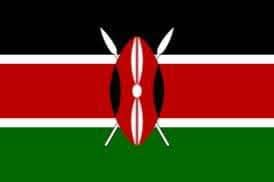Madaxweyne Donald Trump ayaa amray in ciidamada Mareykan ah loo diro magaalada Portland ee gobolka…

Haiti: Fears of hunger as Haiti turmoil spreads
BBC News
Edited by Moses Muli
Published: 21 March 2024, 11:53 AM
Features
Sarah Molin’s life reflects the depth of Haiti’s problems.
A year ago, the 20-year-old was a computer science student living in a suburb of the capital, Port-au-Prince.
But the failed state that Haiti is rapidly becoming has failed its young people most of all.
Months of turmoil and political instability following the murder of President Jovenel Moïse in July 2021 have culminated in the current spate of extreme gang violence.
The fighting has already claimed many thousands of victims, from those whose bodies lie strewn in the streets, to others like Sarah and her family who were forced from their home last August and now live inside an abandoned cinema.
Around 100 families have set up a makeshift camp inside the condemned building which, under normal circumstances, would not be deemed fit for human habitation. There is no sewerage or running water, and Sarah says their daily struggles to find food are becoming critical.
“Sometimes we find food, sometimes we don’t,” she explains in a weary voice.
Juggling her baby godson on her knee – her extended family is all in the camp at the disused Rex Cinema – she gives the appearance of a much older woman.
“I go to school with no food, spend the day hungry and then go to bed still with nothing in my stomach,” she explains.
Many in the camp are suffering from illnesses. Sarah says disease is now spreading through their squatter community. Drugs and medicines are often prohibitively expensive given their food budget rarely stretches to the basics.
“With six dollars we can provide for the family of four people (all adults) for a day,” she says. On the days they can’t raise those funds, they’re dependent on scarce donations and aid. Even that can compound Sarah’s sense of loss instead of bringing her some much-needed compassion.
“Sometimes the staff act like they’re doing us a favor when they give out the aid, and we feel humiliated,” she says, “as though we were taking their food instead of donations.”
Sarah is just one of more than 360,000 internally displaced people in Haiti.
Helicopter flights bringing aid in from the Dominican Republic have begun to arrive. But with the airport in Port-au-Prince and the port both still closed, far more is needed each week.
The political impasse which followed the resignation of Prime Minister Ariel Henry continues. Haitians are constantly told that a US-backed transitional council comprised of seven members is close to becoming a reality. But the interim administration has still not taken power or brought about any kind of stability on the ground in Haiti.
The longer the power vacuum continues, the more the security situation descends into anarchy.
It leaves millions caught in a perfect storm of politics, violence, homelessness and hunger.
In search of a port in that storm, many to head to Cap-Haitien, a northern coastal city that has received thousands of people fleeing the capital.
Cap-Haitien is comparatively calm in security terms. Whenever gangs tried to take root in a neighborhood, they were forced out by swift police operations with the backing of the people, a senior city official told me.
Nevertheless, the port city was already struggling to cope with the infrastructure needs of its own population, particularly in water and power, before it became the country’s main safe haven.
Children seemingly have more of a chance in Cap-Haitien, though.
Six-month-old Jeselin Joseph was dangerously malnourished a few weeks ago. Fortunately, when I met him, he was happily draining a bottle of baby formula, his weight beginning to return. He still had the slightly distended belly and sagging skin which indicate malnutrition in children. But his grandmother Elvire Desir chuckled as he hungrily gulped down his meal.
Jeselin was lucky. He was being cared for in the residential malnutrition center of Second Mile, a local Haitian-run NGO. His mother has been ill and unable to care for him. Once his need was identified as critical based on a series of indicators including arm circumference, the team was able to transfer him to a hospital where he was put on a drip.



This Post Has 0 Comments